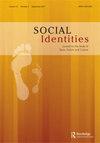工程土著身份:构建一个真正的萨米人
IF 0.7
Q3 ETHNIC STUDIES
引用次数: 0
摘要
本文希望通过关注19世纪现代工业国家作为一个强大而持久的主体的角色,通过有针对性的人为归属,“制造、拥有和使用”土著身份认同,为土著身份认同的研究做出贡献。这些归属是法律再分类过程和法律他人与法律认证机制的结果,重新映射了土著的归属感和自我意识。为此,本文不再把土著身份的类型学看作是祖先关系、领土、群体归属和自我认同的产物,因此土著能动性。这篇文章对这些概念提出了质疑,并以瑞典的Sámi土著居民为例。一些关键的立法和文件被用来揭示瑞典国家如何将当地土著人口重建为合法的,或真实的,Sámi。这些法律上的重新分类逐渐改变了Sámi人民的习惯权利,以适应19世纪现代工业国家巩固的话语中国家的叙述,导致Sámi的控制,减少,法律异化和同化融入更大的社会和国家项目。本文章由计算机程序翻译,如有差异,请以英文原文为准。
Engineering indigenous identity: the construction of an authentic Sámi
ABSTRACT This article wishes to contribute to the study of indigenous identity by focusing on the role of the modern industrial state of the nineteenth century as a powerful and enduring agent that ‘makes, owns, and uses’ indigenous identity through the application of targeted artificial ascriptions. These ascriptions are the result of processes of legal reclassification and mechanisms of legal othering and legal authentication, which remaps indigenous belonging and sense of self. To this end, the article steps away from the typologies of indigenous identity as being exclusively a product of ancestral ties, territoriality, group belonging, and self-identification – and thus indigenous agency. The essay problematizes these conceptualizations and looks at the indigenous Sámi people of Sweden as an illustration. A number of key legislations and documents are used to expose how the state in Sweden reconstructed the local indigenous population into a de jure bona fide, or authentic, Sámi. These legal reclassifications progressively transformed the Sámi people's customary rights to fit the state's narrative within a discourse of nineteenth century modern industrial state consolidation, resulting in the control, reduction, legal dissimilation and assimilation of the Sámi into the greater society and state project.
求助全文
通过发布文献求助,成功后即可免费获取论文全文。
去求助
来源期刊

Social Identities
ETHNIC STUDIES-
CiteScore
2.00
自引率
0.00%
发文量
22
期刊介绍:
Recent years have witnessed considerable worldwide changes concerning social identities such as race, nation and ethnicity, as well as the emergence of new forms of racism and nationalism as discriminatory exclusions. Social Identities aims to furnish an interdisciplinary and international focal point for theorizing issues at the interface of social identities. The journal is especially concerned to address these issues in the context of the transforming political economies and cultures of postmodern and postcolonial conditions. Social Identities is intended as a forum for contesting ideas and debates concerning the formations of, and transformations in, socially significant identities, their attendant forms of material exclusion and power.
 求助内容:
求助内容: 应助结果提醒方式:
应助结果提醒方式:


